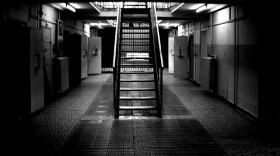It makes sense that young people who have been abused or neglected would be more likely to get in serious trouble. But the numbers are nonetheless pretty amazing. Almost half of the minors in the state's adult prison system get there from the child welfare system, and a child with a history of abuse and neglect is 55 percent more likely to be arrested.
That was Alex's experience. A few years ago things were looking bleak for him and we’re not using his last name because at 19 he is still trying to move past his history in the juvenile justice system. His trouble started in a typical way for most "crossover youth" an innocuous sounding term for such important experiences. He got in trouble for shoplifting and some fights at school. Then when he was 15, there was as a total family collapse and his behavior collapsed with it. Things went downhill from there.
"They had arrested me and then removed my sisters and put them in foster care," he says. "There really wasn't somewhere for me to go back to."
That’s how kids can get lost in a juvenile justice black hole. There are plenty of studies that show kids in foster care spend longer in the juvenile justice system and are treated more harshly than other kids.
Alex spent over two years in that system in part because there wasn’t really any other place for him to go. At the conservative end, his experience probably cost the state almost 150 thousand dollars and at the end of that, Alex was still behind in school and needed help figuring out exactly to meet his goals, like going to college. Then he got connected to Paula Laquerre.
Laquerre works for the Berrien County Department of Human Services. She's the county coordinator of a program called the Michigan Youth Opportunity Initiative, or MYOI.
Laquerre makes up an additional human layer in the foster care system. She’s not a caseworker, but it’s her full time job to support about 21 kids who spent at least part of their lives in the foster care system. Plenty of research backs up how a good relationship with somebody like her, somebody who knows the system and is willing to make it work for these kids, can change the trajectory of a young person’s life. That is especially true for kids who’ve been in the juvenile justice system.
Laquerre looks for any opportunity to build those relationships. Something as simple as a car ride. While she's driving Alex to the DHS office they chat about unimportant things like how much they both hate Algebra. But they also talk about something very important to Alex, how close he is to being able to afford his own car. He's close.
When he finally does buy one, he’ll be able to get to college and his job much more easily. The car will then just be added to the list of things Laquerre has helped him to do in the year and a half they’ve known each other. A list that Alex says includes, "getting my driver's license, helping me with interview clothing, looking for housing." He goes on, "She's helped me with meeting new people, finding jobs."
He is grateful for the support and says Laquerre has been, "basically a Godsend"
Laquerre says they work like a team to support other young people like him. She calls him her "right hand man," and says, "I have no doubt that he's going to do great things." Alex is the Vice President of his MYOI group, he helps with fundraising and he does public speaking to other at-risk youth.
Alex’s turn-around is pretty exceptional. In part that’s because of the support he gets from Laquerre. Now he’s working with his county DHS office and Georgetown University to try to push through bigger changes to the way all kids in foster care are treated when they get into trouble.
For her part Laquierre says she just wants more people to do whatever it takes to support kids coming out of the child welfare system. "If I had a dream," she says, "If I had one wish, that would be it."
When I say that it sounds like that person might be her for Alex she responds, "Yeah, I hope so."





